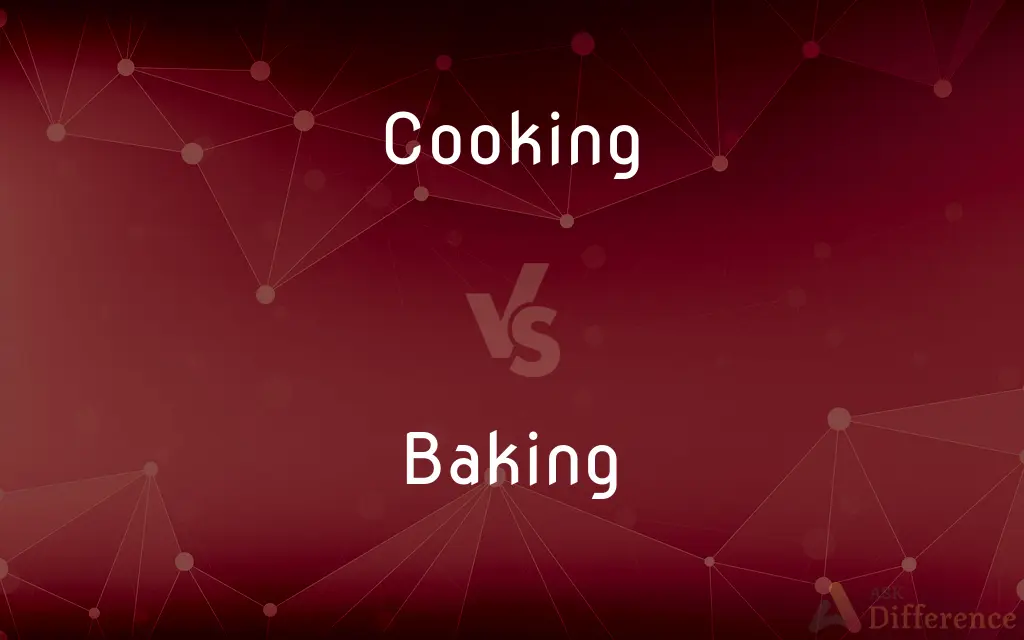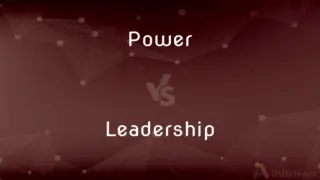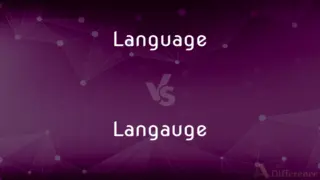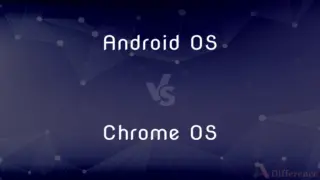Cooking vs. Baking — What's the Difference?
Edited by Tayyaba Rehman — By Maham Liaqat — Updated on March 16, 2024
Cooking is a broad term for preparing food using heat, while baking specifically refers to cooking food by dry heat in an oven.

Difference Between Cooking and Baking
Table of Contents
ADVERTISEMENT
Key Differences
Cooking encompasses a wide range of methods for preparing food, including boiling, frying, grilling, steaming, and baking. It involves the use of various heat sources and techniques to transform raw ingredients into edible meals. Baking, on the other hand, is a specific type of cooking that uses prolonged dry heat in an oven. It is most commonly associated with the preparation of bread, cakes, pastries, and other flour-based goods, but it can also include dishes like casseroles and baked potatoes.
Cooking can be done on a stovetop, over a fire, in an oven, or with other appliances, and it allows for a great deal of flexibility and creativity in terms of ingredients, flavors, and textures. Baking typically requires precise measurements and adherence to recipes, especially for baked goods like bread and pastries, where chemical reactions between ingredients are crucial for achieving the desired outcome.
While cooking often allows for adjustments and improvisation during the process, baking is generally more precise, with less room for alteration once the process has begun. The success of baked goods often depends on the exact combination of ingredients, temperatures, and timing.
Cooking methods like frying, sautéing, or grilling often result in immediate changes to the food, allowing cooks to adjust techniques and seasonings on the fly. In contrast, baking involves a slower transformation of the food, with the final result only revealed after the baking process is complete.
Both cooking and baking are essential culinary skills, each with its own set of techniques, tools, and applications. While cooking offers a broad canvas for culinary expression, baking requires a more methodical approach, often likened to a science due to its precision.
ADVERTISEMENT
Comparison Chart
XDefinition
Preparing food using various heat methods.
Cooking food by dry heat, especially in an oven.
Methods
Boiling, frying, grilling, steaming, baking.
Primarily uses an oven for dry heat.
Flexibility
Allows for more improvisation.
Requires precise measurements and adherence to recipes.
Associated Foods
Includes a wide variety of dishes.
Often associated with bread, cakes, pastries.
Skill Set
Broad and varied, depending on the method.
More precise, akin to a science.
Compare with Definitions
Cooking
Can be done using multiple heat sources, including stovetops, ovens, and open flames.
Outdoor cooking on an open fire added a smoky flavor to the meal.
Baking
A method of cooking that uses dry heat, typically in an oven, to prepare food.
Baking the cake required precise measurements of flour and sugar.
Cooking
The art of preparing food by applying heat, encompassing various techniques and methods.
Cooking dinner involved grilling chicken and steaming vegetables.
Baking
Associated with the creation of desserts, breads, and pastries.
Her passion for baking was evident in the intricate pastries she made.
Cooking
Involves a broad spectrum of culinary practices, from quick frying to slow simmering.
His cooking skills were evident in the complex flavors of the stew.
Baking
Requires attention to detail, from ingredient ratios to oven temperatures.
The success of baking bread depends on the correct yeast to flour ratio.
Cooking
Allows for real-time adjustments to flavors and textures.
She tasted the sauce while cooking and adjusted the seasonings accordingly.
Baking
Involves chemical reactions that transform ingredients into finished dishes.
Baking soda and acid react to create the lift in cakes and cookies.
Cooking
Encourages creativity and experimentation with ingredients.
Cooking with seasonal produce inspired her to create new recipes.
Baking
Often considered a more precise and scientific culinary practice.
Baking requires a methodical approach, much like following a scientific formula.
Cooking
Cooking, cookery, or culinary arts is the art, science, and craft of using heat to prepare food for consumption. Cooking techniques and ingredients vary widely, from grilling food over an open fire to using electric stoves, to baking in various types of ovens, reflecting local conditions.
Baking
Baking is a method of preparing food that uses dry heat, typically in an oven, but can also be done in hot ashes, or on hot stones. The most common baked item is bread but many other types of foods are baked.
Cooking
To prepare (food) for eating by applying heat.
Baking
To cook (food) with dry heat, especially in an oven.
Cooking
To prepare or treat by heating
Slowly cooked the medicinal mixture.
Baking
To harden or dry (something) by subjecting to heat in or as if in an oven
Bake bricks.
Cooking
(Slang) To alter or falsify so as to make a more favorable impression; doctor
Disreputable accountants who were paid to cook the firm's books.
Baking
To cook food with dry heat.
Cooking
To prepare food for eating by applying heat.
Baking
To become hardened or dry by or as if by having been subjected to the heat of an oven.
Cooking
To undergo application of heat especially for the purpose of later ingestion.
Baking
The act or process of baking.
Cooking
(Slang) To happen, develop, or take place
What's cooking in town?.
Baking
An amount baked.
Cooking
(Slang) To proceed or perform very well
The band really got cooking after midnight.
Baking
A social gathering at which food is cooked by baking and then served.
Cooking
A person who prepares food for eating.
Baking
Present participle of bake.
Cooking
(uncountable) The process of preparing food by using heat.
Baking
That bakes.
Baking bread; baking clay
Cooking
An instance of preparing food by using heat.
Baking
(figuratively) Of a person, an object, or the weather: very hot; boiling, broiling, roasting.
I'm baking – could you open the window?
The car was baking after having been parked in the sun the whole afternoon.
Cooking
The result of preparing food by using heat.
Baking
An action in which something is baked.
I'm going to do some baking this afternoon.
Cooking
(uncountable) One's ability to prepare food; cookery.
My cooking isn't very good. I don't have any idea how to prepare a good meal.
I missed my mum's cooking while I was at university.
Baking
The way in which something is baked.
Cooking
(uncountable) The style or genre of food preparation.
What you've produced is a perfect example of authentic Chinese cooking.
Baking
(countable) The production of a batch of baked product.
Cooking
(uncountable) The cheapest available beer for sale in a public house; cooking bitter or cooking lager.
Baking
The act or process of cooking in an oven, or of drying and hardening by heat or cold.
Cooking
Designed for culinary purposes
I filled the cooking pot with water
I put a lid on the cooking pan
Baking
The quantity baked at once; a batch; as, a baking of bread.
Cooking
(informal) In progress, happening.
The project took a few days to gain momentum, but by the end of the week, things were really cooking.
Baking
Making bread or cake or pastry etc.
Cooking
Present participle of cook
Baking
Cooking by dry heat in an oven
Cooking
The practice or manner of preparing food or the food so prepared; cookery.
Baking
As hot as if in an oven
Cooking
The act of preparing something (as food) by the application of heat.
Cooking
The act of preparing something (as food) by the application of heat;
Cooking can be a great art
People are needed who have experience in cookery
He left the preparation of meals to his wife
Common Curiosities
How does the choice of cooking method affect the nutritional value of food?
Different cooking methods can affect the nutritional value by altering the food's chemical structure, with some methods preserving more nutrients than others. For example, boiling might lead to nutrient loss in water, whereas baking might retain more nutrients within the food.
Can baking be considered a form of cooking?
Yes, baking is a specific type of cooking that involves dry heat, usually in an oven.
Is it possible to bake without an oven?
While traditional baking is done in an oven, alternative methods like using a Dutch oven over an open fire or using toaster ovens and specialized baking appliances can also be considered forms of baking.
Why do baked goods often require a resting or cooling period after baking?
Cooling allows the structure of baked goods to set and stabilizes the chemical changes that occur during baking, affecting texture and ease of slicing.
Can the same ingredients produce different results in cooking vs. baking?
Yes, the application of heat and the method used can dramatically alter the texture, flavor, and appearance of the same ingredients.
What role does moisture play in baking?
Moisture is crucial in baking for creating steam, which contributes to the rise of baked goods, and for hydrating starches and proteins, affecting the final texture.
Why is precision more important in baking than in other forms of cooking?
Baking often involves chemical reactions (like yeast fermentation or the action of leavening agents) that require precise ingredient ratios and temperatures to achieve the desired texture and rise.
Can cooking techniques be combined, like baking and grilling?
Yes, many dishes involve multiple cooking techniques, such as searing meat before baking it or grilling vegetables before incorporating them into a baked dish.
How has technology influenced modern cooking and baking?
Technological advancements have introduced precise temperature controls, specialized appliances, and innovative cooking techniques, enhancing both traditional and modern cooking and baking methods.
Are there cultural or regional differences in cooking and baking techniques?
Yes, cultural and regional differences significantly influence cooking and baking techniques, reflecting local ingredients, traditions, and tastes, leading to a rich diversity of culinary practices worldwide.
Share Your Discovery

Previous Comparison
Power vs. Leadership
Next Comparison
Language vs. LangaugeAuthor Spotlight
Written by
Maham LiaqatEdited by
Tayyaba RehmanTayyaba Rehman is a distinguished writer, currently serving as a primary contributor to askdifference.com. As a researcher in semantics and etymology, Tayyaba's passion for the complexity of languages and their distinctions has found a perfect home on the platform. Tayyaba delves into the intricacies of language, distinguishing between commonly confused words and phrases, thereby providing clarity for readers worldwide.















































